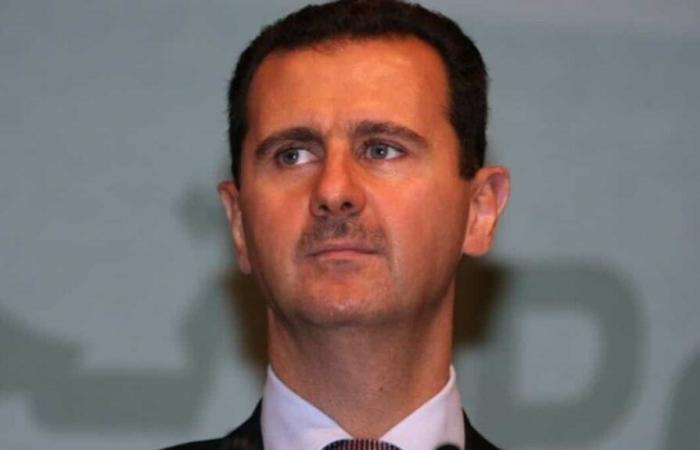More than a week after being overthrown, former Syrian President Bashar al-Assad broke his silence on Monday, claiming that he had only fled Syria after the fall of Damascus to Syria. a rebel coalition and calling the country’s new leaders “terrorists”.
• Also read: In Syria, former detainees revisit the “cells of despair”
• Also read: Returning Syrians ‘extremely vulnerable’ to mines
• Also read: A UN envoy in Damascus, a week after the fall of Assad
On December 8, an insurgent alliance led by the radical Islamist group Hayat Tahrir al-Sham (HTS) entered Damascus and announced the overthrow of power, after a dazzling offensive which allowed it to seize a large part of of the country in eleven days. Abandoned by his Iranian and Russian allies, Mr. Assad fled to Moscow.
“My departure from Syria was not planned nor did it take place during the final hours of the battle, contrary to some allegations,” Bashar al-Assad said in a statement in English on the Telegram channel of the presidency.
“Moscow demanded (…) an immediate evacuation to Russia on the evening of Sunday December 8,” added Mr. Assad, who ruled Syria with an iron fist for 24 years, affirming that his country was now “in the hands of terrorists”.
HTS, the former Syrian branch of Al-Qaeda, claims to have broken with jihadism but remains classified as “terrorist” by several Western capitals, including Washington.
After 50 years of unchallenged rule by the Assad clan and relentless repression against any opponent or presumed opponent, the new authorities are working to reassure the international community and the chancelleries are gradually making contact with their leaders, including Abu Mouhammad al -Jolani, the head of HTS.
On Monday, the European Union announced that it would send a high representative to Damascus to meet the new leaders. The EU will judge on actions “going in the right direction”, declared the head of European diplomacy, Kaja Kallas.
“Credible and inclusive” transition
The day before, the UN special envoy for Syria, Geir Pedersen, met Mr. Jolani, to whom he stressed the need for a “credible and inclusive” transition, according to his services.
The United Kingdom and the United States also said they had established contacts with HTS and France announced it would send a diplomatic mission to Damascus on Tuesday, the first in 12 years.
Neighboring Turkey, a major player in the conflict in Syria and support of the new authorities, reopened its embassy in Damascus on Saturday, saying it was “ready” to provide military aid if the new Syrian government requested it.
Several countries and organizations had welcomed the fall of Assad, but said they were waiting to judge on the facts the treatment by the new authorities, Sunni Muslims, of the minorities of this multi-ethnic and multi-religious country.
The new prime minister in charge of the transition until March 1, Mohammad al-Bashir, has promised to “guarantee the rights of all” as Syrians try to return to normal life.
In this context, the Syrian pound has recovered against the dollar.
“In every country in the world, the local currency collapses with the fall of a regime. Here in Syria, it seems to be the opposite,” notes Raghid Mansour, owner of a jewelry store in a Damascus souk.
According to an AFP photographer, employees of the capital’s airport painted on Monday on planes of the private Syrian airline Cham Wings, the three-star flag symbol of the popular uprising of 2011 against Bashar al-Assad and adopted by the new authorities.
This flag replaced the old one in the airport halls, according to this photographer.
In a military compound near Damascus, residents, including children, set fire to the houses of officers of the former government, AFP journalists noted. Tables, cabinets, chairs have been looted before.
In Latakia, Syria’s second port on the Mediterranean, hundreds of men and some women members of the former government forces lined up outside offices where the new authorities asked them to surrender their weapons and save.
“We are expecting at least a thousand today,” the person in charge of the scene, Mohamad Mustapha, 26, a former soldier from Idlib (north-west), a rebel stronghold, told AFP. The new authorities will carry out investigations “into their past” and “in the event of a serious crime, they will be transferred to justice”, he explains.
“Don’t close your eyes”
Nearly 14 years of civil war triggered by the repression of pro-democracy demonstrations have left a heavy toll in Syria, with half a million dead and six million inhabitants having fled abroad.
Ayoush Hassan, from the countryside of Aleppo (north), has been desperately searching for his son since the fall of Assad, like many Syrians whose loved ones disappeared during the conflict and decades of repression.
“We want our children, alive, dead, burned, in ashes, buried in mass graves,” he implores.
In this context of historic change in a devastated and fragmented country, neighboring Israel carried out intense strikes during the night from Sunday to Monday on military sites in the coastal region of Tartous, according to the Syrian Observatory for Human Rights. ‘Man.
According to the NGO, these are the “heaviest” Israeli strikes “since 2012” in this region, which is home to a Russian naval base, while the Israeli army claims to want to prevent Syrian weapons from falling into the hands of extremists.
On the heights of Tartous, the roads are littered with broken glass. “The village did not sleep all night. The children were crying,” testifies a resident who refuses to give his name.






